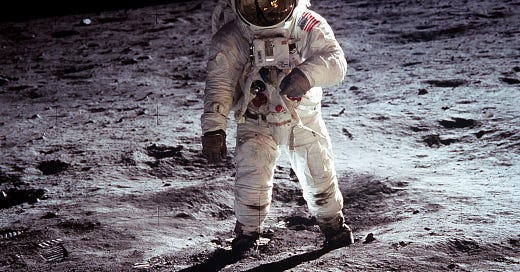The official account of the Apollo Space Program is likely a myth. Astronauts likely never stepped foot on the Moon. More precisely, evidence of manned expeditions to the Moon is all suspect. The evidence consists mainly of the television broadcasts and various other imagery. The broadcasts, imagery, technical reports and other artifacts from the Apollo Space Program are extraordinarily realistic but do not constitute proof of the authenticity.
The evidence also includes rock and other samples collected from the surface of the Moon, according the the US government. However, independent isotopic analysis has found no meaningful difference between the claimed Moon samples and Earth rocks.
And yet, a majority of the US public are certain of the authenticity of the Apollo Space Program. In a recent survey by Statista, 61% of the respondents answered “Strongly disbelieve” when posed the following question:
“To what extent do you believe in the conspiracy theory that the moon landing was faked?”
The question is: “Why does this myth persist?” Or equivalently, “Why has the official account of the Apollo Space Program been uncritically accepted?”
One explanation is “ideology”. Apollo was envisioned as the embodiment of the national spirit. In his “We choose to go the Moon” speech, President Kennedy defined Apollo as a part of the national character:
“We choose to go to the moon in this decade and do the other things, not because they are easy, but because they are hard, because that goal will serve to organize and measure the best of our energies and skills, because that challenge is one that we are willing to accept, one we are unwilling to postpone, and one which we intend to win, and the others, too.”
The US public believes deeply in the righteousness of the country and the US government and the deception and betrayal of a fraudulent Apollo is unimaginable.; skepticism of Apollo, is a deeply disorienting prospect. It involves a loss of a societal reference point. A fraudulent Apollo would be the inversion of society; what was once revered would become the reviled.
In these respects, the US public and even those abroad who look to the US as the nation of promise, deny the emptiness of the US government claims to the authenticity of Apollo. Belief in Apollo is unchallenged, in part, because a fraudulent Apollo is too painful to contemplate.




As usually happens with people who live through momentous events, like the assassination of JFK or 9/11, I remember where I was and what I was doing when I first heard the news of the alleged landing of Apollo 11 on the moon. I was in a Bombardier track vehicle travelling from North camp to South camp in Resolute, Nunavut (then the Northwest Territories), far above the Arctic Circle. The driver had just heard the news and was super excited about it. As far as I can recall I wasn’t excited because I didn’t really believe it. As far as I can remember I had heard a rumour in the Physics community that the van Allen radiation belts made it impossible. My recollection, however, could be a false memory. In any case, I soon came to believe that the moon landings were real because I could not imagine that the whole culture in which I lived could possibly be so completely deceived. I believed it for most of my life.
During the last several years, however, I have become a lot more skeptical about a lot of things that are part of our society’s general understanding of the world. I have now done enough research on the moon landings to be pretty sure they were all a hoax. I have been so busy lately with other researches, e.g., concerning the prevailing Covid narrative, that I haven’t done quite enough investigation of the moon landings to be absolutely certain that we were deceived. I always like to go back and forth a few times looking at arguments for and against before I become utterly convinced of anything. It’s something I want to return to, though, and remove my remaining slim shadow of doubt. I think that the moon landings deceptions are important because they provide insight into how psychological operations work.